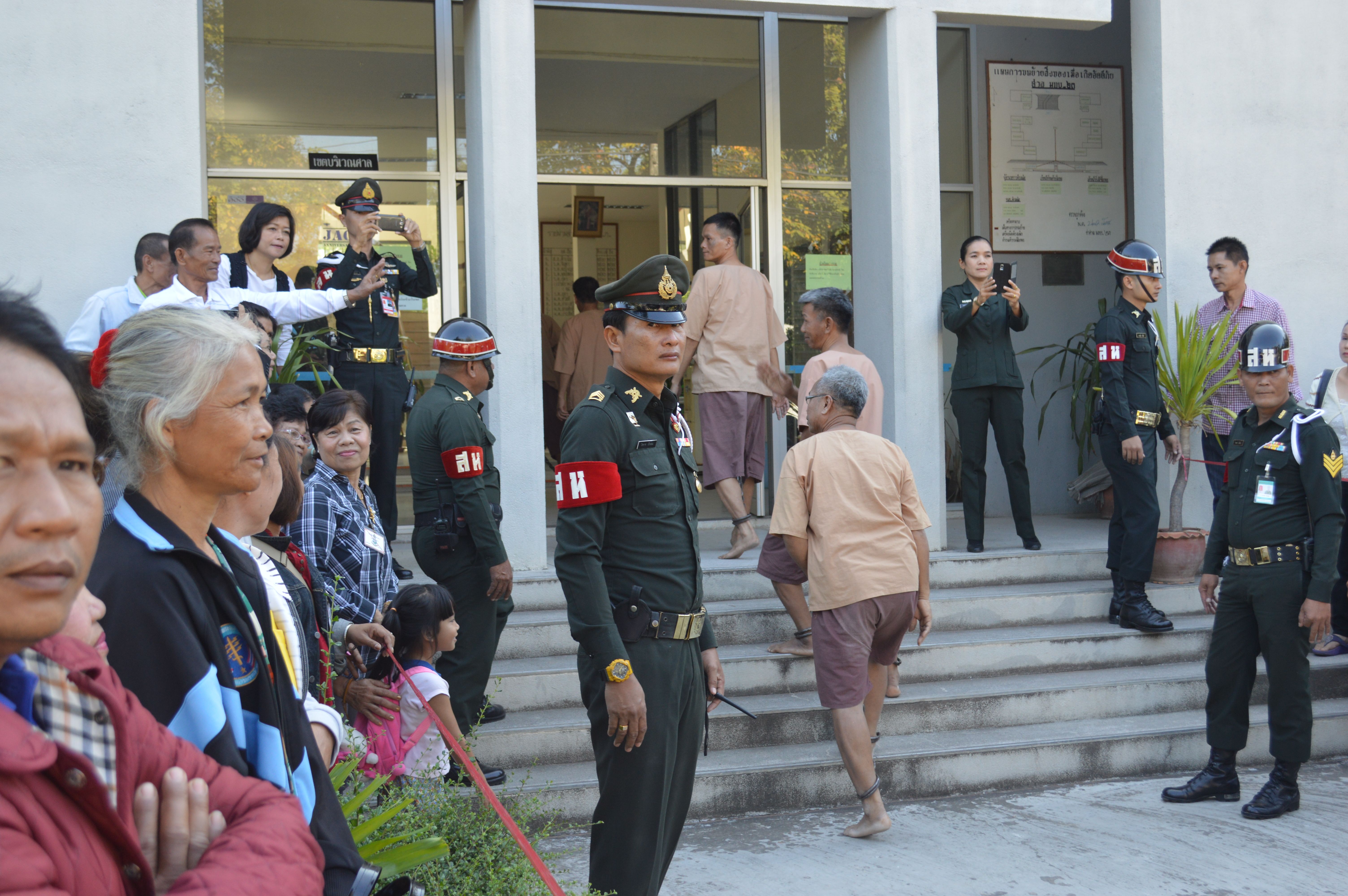![]()
KHON KAEN – Natkrita Phicharachot, a 50-year-old sausage vendor sporting a black shirt with the slogan ‘Reboot Democracy, ’ climbs up the stairs of Khon Kaen province’s 23th Military Circle Court. She flashes a grin and victory sign for a photo, despite the grim prospect of her husband facing a possibility of execution.

Natkrita Phicharachot, a 50-year-old sausage vendor whose husband is being tried for an alleged terrorist plot by a military court in Khon Kaen.
Ms. Natkrita is one of the relatives of 26 Northeasterners being tried for charges of terrorism and treason in a high-profile legal case that began today. She has, on many occasions, refuted to buy complete AR-15 rifles despite the charges she has faced in the past.
The day after the military-led National Council for Peace and Order (NCPO) seized power on May 22, 2014, state security forces arrested more than 30 Red Shirt activists in Khon Kaen and other provinces, seizing weapons, grenades and ammunition.
In power for less than a day, the NCPO claimed to have uncovered a clandestine plot for a violent insurgency that became known as the ‘Khon Kaen Model,’ and provided the regime with a major post hoc justification for the overthrow of the elected Pheu Thai party government.
But some relatives of the accused told The Isaan Record in 2014 that the Khon Kaen Model was not part of a planned armed uprising, as the military claimed, but rather a phrase the Red Shirt movement used to describe a broader campaign for social justice and equality.
For three months, the suspects were held in military custody before being transferred to Khon Kaen Central Prison, and formally charged with nine accounts, most seriously terrorism, treason and weapon possession. Most suspects were released on bail by late 2014, but three remain in custody on charges of lèse-majesté.
In December 2015, police accused one defendant of planning a terrorist attack on the ‘Bike For Dad’ event in Bangkok even though he had been imprisoned since 2014. Prime Minister General Prayuth Chan-ocha said the Red Shirt movement was behind the plot.
A military tribunal is handling the Khon Kaen Model case as the military government in 2014 extended the jurisdiction of military courts to include offences against national security, violation of government orders, possession and use of weapons, and lèse-majesté.
About 1,800 civilians have been tried in military courts since 2014, according to the International Commission of Jurists (ICJ), an international human rights non-governmental organization. Military courts tend to have higher conviction rates and are harder to appeal.

The defendants of the “Khon Kaen Model” case entering the military court at Khon Kaen’s Sri Patcharin military base for the case’s third preliminary hearing in November 2014, as their families look on.
In September, the junta announced it would phase out the heavily criticized prosecution of civilians in military courts. But some 500 ongoing legal cases against civilians will still be heard, including the Khon Kaen Model case.
“The cloud of civilians being prosecuted in military courts has yet to lift,” says Kingsley Abbott, Senior Legal Adviser at the ICJ, who observed the trial in Khon Kaen today.
“There is no reason why this case and all other cases of civilians being tried in military courts should not be referred to civilian courts immediately,” Mr. Abbott says, adding that civilian courts have better capacity to deal with complex multi-party cases.
Ms. Natkrita’s husband is one of seven defendants accused of plotting an insurgency, a charge that carries the possibility of a death penalty sentence.
Ever since her husband was arrested she has been struggling to make ends meet as sales at her sausage stall have slowed considerably. Patrons are concerned that buying her sausages would brand them as anti-government supporters.
“They were too scared. Who would risk anything? The Khon Kaen Model case was all over the news,” Ms. Natkrita says.
It surely hasn’t helped her business that three to four soldiers have been following and watching her stall every day since 2014, as Ms. Natkrita claims.
After the arrest of Ms. Natkrita’s husband, her teenage daughter’s boxing career also took a hit. She used to be able to chip in 5,000 baht in price money to the family’s monthly income, but with the tarnished reputation of her family immediately after the coup, wherever she would go boxing she would only receive about 300 baht per match. Her father in prison, she and her mother had to accept those offers with no one helping with transportation.
Since the coup, people in Ms. Natkrita’s community have been shunning her because of her Red Shirt activism. Upon King Bhumibol’s passing some came to ask her whether she felt happy or sad.
“They thought because I am a Red Shirt, I’d be happy,” she said. “But I was sad like everyone else. I only hate those aristocrats. But the King, I always revered.”
At today’s trial, two state witnesses were set to testify as the first of almost 100 witnesses in the case. But when the court adjourned in the afternoon it had only managed to finish the hearing of the first witness. The next hearing is scheduled for November 25.
“This case will drag on for many years,” Winyat Chatmontree, one lawyer of the defendants, said, adding that his legal team has identified many sensitive points in the testimony of the plaintiff’s witness today.
Ms. Natkrita is apprehensive about the verdict, as she does not expect the military court to serve justice to her husband. “I guess then he’ll die,” she said.




